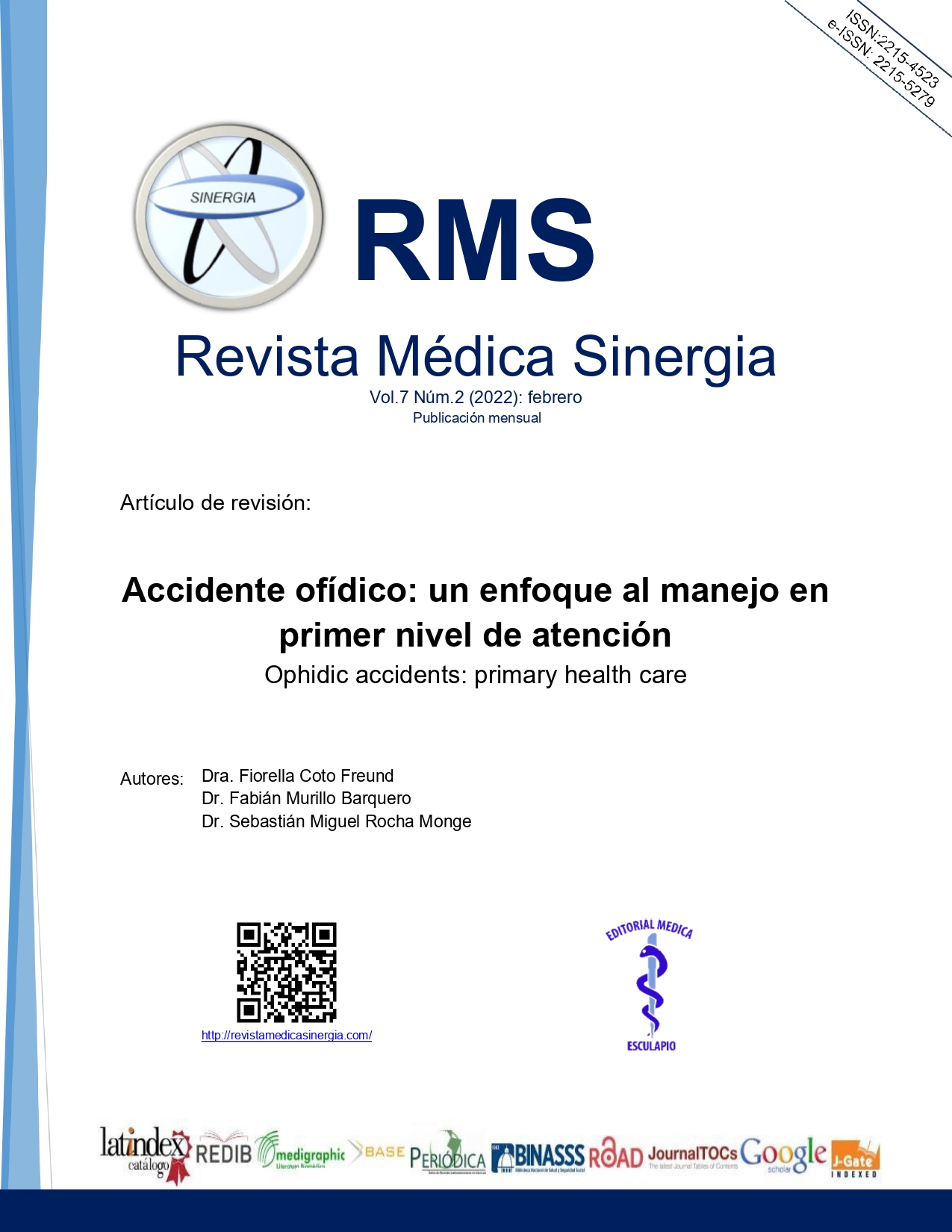Resumen
Los accidentes ofídicos corresponden a una importante causa de morbilidad y mortalidad a nivel mundial, se presentan aproximadamente 2.7 millones de eventos anuales. Se conoce gran variedad de serpientes venenosas agrupándose en dos principales familias, Elapidae (serpiente marina y Coral) y Viperidae (tobobas o Viperidos), ambos presentes en América Central, siendo de estos mas frecuentes las mordeduras por Vipéridos. Conocer el tipo de veneno administrado por estos animales es de gran importancia para determinar el manejo y tratamiento a seguir con cada paciente, así como el suero antiofídico a utilizar según corresponda.
Palabras clave
Citas
Pach S, le Geyt J, Gutiérrez JM, Williams D, Maduwage KP, Habib AG, et al. Paediatric snakebite envenoming: the world’s most neglected “Neglected Tropical Disease”? Archives of disease in childhood. 2020;105(12):1135–9.
Arias-Rodríguez J, Gutiérrez JM. Circumstances and consequences of snakebite envenomings: A qualitative study in south-eastern Costa Rica. Toxins. 2020;12(1):1–12.
Gutiérrez JM, Calvete JJ, Habib AG, Harrison RA, Williams DJ, Warrell DA. Snakebite envenoming. Nature reviews Disease primers. 2017;3:17063.
Longbottom J, Shearer FM, Devine M, Alcoba G, Chappuis F, Weiss DJ, et al. Vulnerability to snakebite envenoming: a global mapping of hotspots. The Lancet. 2018;392(10148):673–84.
Bravo-Vega CA, Cordovez JM, Renjifo-Ibáñez C, Santos-Vega M, Sasa M. Estimating snakebite incidence from mathematical models: A test in Costa Rica. PLoS neglected tropical diseases. 2019;13(12):e0007914.
Gutiérrez JM, Maduwage K, Iliyasu G, Habib A. Snakebite envenoming in different national contexts: Costa Rica, Sri Lanka, and Nigeria. Toxicon: X. 2021;9–10.
Sasa M, Segura Cano SE. New insights into snakebite epidemiology in Costa Rica: A retrospective evaluation of medical records. Toxicon: X [Internet]. 2020;7:100055. Available from: https://doi.org/10.1016/j.toxcx.2020.100055
Gutiérrez JM, Fan HW. Improving the control of snakebite envenomation in Latin America and the Caribbean: A discussion on pending issues. Transactions of the Royal Society of Tropical Medicine and Hygiene. 2018;112(12):523–6.
Gutiérrez JM, Rojas G, Rica UDC. El envenenamiento por mordedura de serpiente en Centroamérica Facultad de Microbiología [Internet]. 2005. Available from: http://www.icp.ucr.ac.cr/es/material/el-envenenamiento-por-mordedura-de-serpiente-en-centroamerica-0
Greene S. Coral Snake Envenomations in Central and South America. Current Tropical Medicine Reports. 2020;7(1):11–6.
Russell JJ, Schoenbrunner A, Janis JE. Snake Bite Management: A Scoping Review of the Literature. Plastic and Reconstructive Surgery - Global Open. 2021;1–12.
Bolon I, Durso AM, Mesa SB, Ray N, Alcoba G, Chappuis F, et al. Identifying the snake: First scoping review on practices of communities and healthcare providers confronted with snakebite across the world. PLoS ONE. 2020;15(3):1–24.
Parker-Cote J, Meggs WJ. First aid and pre-hospital management of venomous snakebites. Tropical Medicine and Infectious Disease. 2018;3(2).
Naik BS. “Dry bite” in venomous snakes: A review. Toxicon [Internet]. 2017;133:63–7. Available from: http://dx.doi.org/10.1016/j.toxicon.2017.04.015
Pucca MB, Knudsen C, Oliveira IS, Rimbault C, Cerni FA, Wen FH, et al. Dry Bite. 2020;4–7.

Esta obra está bajo una licencia internacional Creative Commons Atribución-NoComercial 4.0.
Derechos de autor 2022 Array


